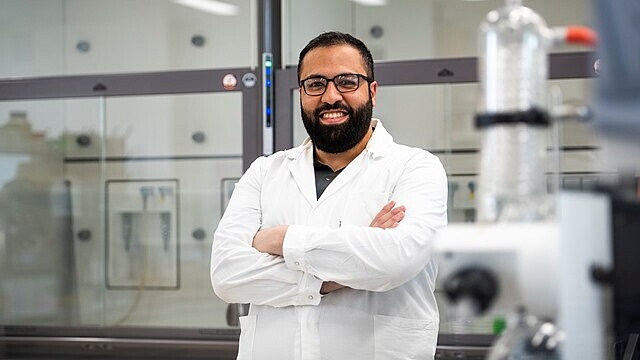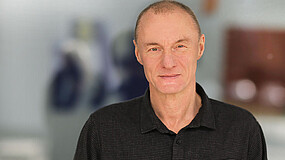The 27-year-old comes from Aleppo and talks about his studies, his life - and why you should follow your dreams.

Ezzat, did you always want to study what you are doing in Zittau?
I studied chemistry in Aleppo for about four semesters - and then it wasn't possible because of the war. In Germany, I first had to learn the language, which wasn't easy at first.
How did you end up in Zittau?
My German teacher - a retired teacher - visited me in the reception camp in Löbau. She encouraged me to continue with my studies - I could have worked. She gave me the telephone number of the International Office in nearby Zittau. That was the beginning! Then I was admitted to chemistry in Zittau. However, I was also told that the subject would soon no longer exist and that "Molecular Biotechnology" might be something for me. Here, students are trained to work in molecular genetics, cell biology, immunology, biochemistry, bioanalytics, toxicology, microbiology and bioprocess engineering. This fits in well with chemistry and you have very good career opportunities in science as well as in business later on.
When in your life did you know which direction you wanted to take?
Even as a child, I dreamed of becoming a scientist. In Syria, your A-levels decide what you can study. I could have done economics, chemistry or mechanical engineering. My parents had a good idea that chemistry was for me. In Syria, I would probably have gone into pharmacy after my studies.
What is it like for you here?
I've been living here for over four years now and feel very comfortable. The language is also good now. I'm also relatively close to my parents and my brother in Denmark. I like the great atmosphere at Zittau/Görlitz University of Applied Sciences. The course is really mine and most of the people are super nice. You can ask the professors anything. There's also a real interest in Syria and life there. I don't know this personal touch from lecturers in Syria. I also think the exchange with other students is great. Engineers ask me, for example, how the immune system or the PCR tests for corona work.
And the city?
Perfect for students! There's plenty of variety, there are great sports facilities, Lake Olbersdorf is just around the corner and there's always something fun to do. And the people are really nice.
How do you find the right degree course?
The most important thing is to do what really interests you, what you want to do. Also see what you can do with it later. The better educated you are, the better and more meaningful your life will be!
The interview was conducted by Björn Sievers for the initiative "Pack Dein Studium. Best in Saxony."
